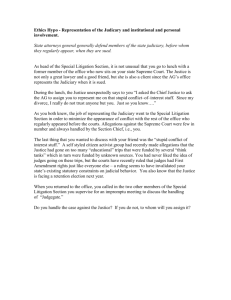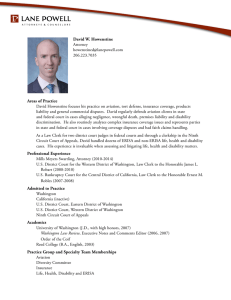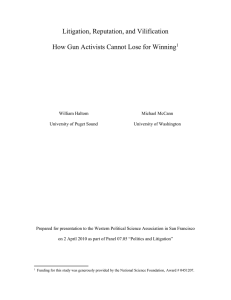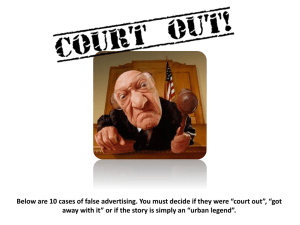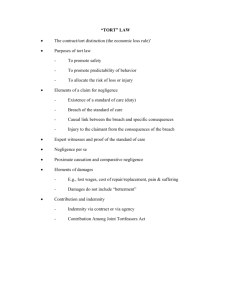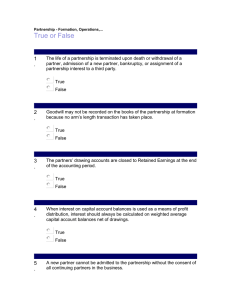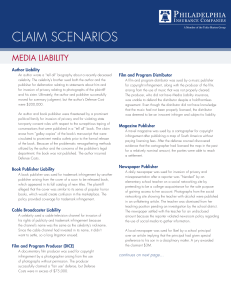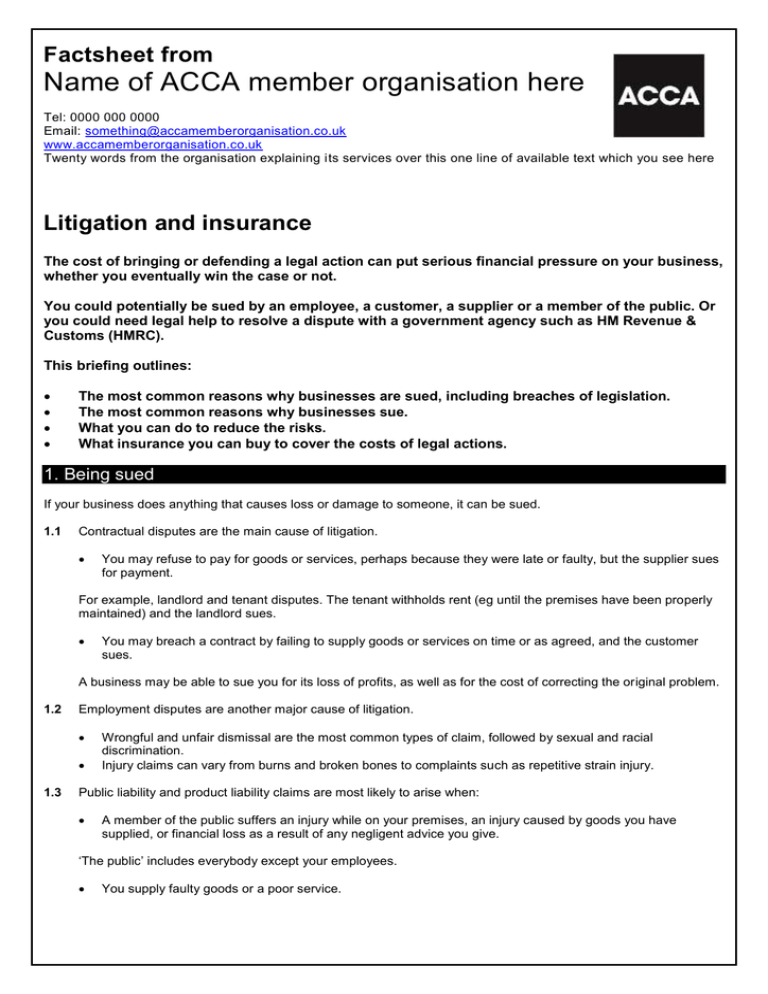
Factsheet from
Name of ACCA member organisation here
Tel: 0000 000 0000
Email: something@accamemberorganisation.co.uk
www.accamemberorganisation.co.uk
Twenty words from the organisation explaining its services over this one line of available text which you see here
Litigation and insurance
The cost of bringing or defending a legal action can put serious financial pressure on your business,
whether you eventually win the case or not.
You could potentially be sued by an employee, a customer, a supplier or a member of the public. Or
you could need legal help to resolve a dispute with a government agency such as HM Revenue &
Customs (HMRC).
This briefing outlines:
The most common reasons why businesses are sued, including breaches of legislation.
The most common reasons why businesses sue.
What you can do to reduce the risks.
What insurance you can buy to cover the costs of legal actions.
1. Being sued
If your business does anything that causes loss or damage to someone, it can be sued.
1.1
Contractual disputes are the main cause of litigation.
You may refuse to pay for goods or services, perhaps because they were late or faulty, but the supplier sues
for payment.
For example, landlord and tenant disputes. The tenant withholds rent (eg until the premises have been properly
maintained) and the landlord sues.
You may breach a contract by failing to supply goods or services on time or as agreed, and the customer
sues.
A business may be able to sue you for its loss of profits, as well as for the cost of correcting the original problem.
1.2
Employment disputes are another major cause of litigation.
1.3
Wrongful and unfair dismissal are the most common types of claim, followed by sexual and racial
discrimination.
Injury claims can vary from burns and broken bones to complaints such as repetitive strain injury.
Public liability and product liability claims are most likely to arise when:
A member of the public suffers an injury while on your premises, an injury caused by goods you have
supplied, or financial loss as a result of any negligent advice you give.
‘The public’ includes everybody except your employees.
You supply faulty goods or a poor service.
1.4
Shareholders and investors can sue you for breach of ‘fiduciary duty’.
The Companies Acts put a wide range of responsibilities on directors. They include more than 200 offences
for which a director can be held personally liable.
The personal liabilities of a director are unlimited, whereas your company has limited liability.
1.5
Typically, directors are jointly liable, so you could be sued personally for the losses resulting from the actions
of another director (see box).
The Official Receiver and liquidators have an opportunity to review all the transactions of a business which has
ceased to trade (on behalf of the creditors).
If there is any evidence of wrongdoing, you, as a company director, could be sued personally.
If your business is sued, you have to pay for the ongoing legal advice until the dispute is settled. The majority of
cases are dropped, settled out of court, or reach the court stage but at least do not require the services of a QC.
But in some cases, costs can turn out to be substantial. And even if you win a case there is no guarantee that
your costs will be paid. The judge may order both parties (the claimant and the defendant) to pay their own costs.
2. Law enforcement
Government organisations with responsibility for enforcing legislation have a duty to bring cases against businesses
which break the law.
Below are some of the main problem areas:
2.1
HMRC is particularly active.
The average settlement of a business tax investigation is about £5,000 (including tax, interest and penalties).
Accountancy and legal fees can add significantly to these costs.
2.2
The Department for Work and Pensions pursues businesses for non-payment or incorrect payment of National
Insurance contributions.
2.3
The Health & Safety Executive makes over 1,100 successful prosecutions a year.
2.4
About 5,500 businesses are served improvement notices or prevented from operating by prohibition notices.
The Trading Standards Institute prosecutes several thousand businesses each year.
The most common prosecution is for false trade descriptions.
For example, when a business misleads a customer about the quantity, quality or price of a product.
2.5
Companies House prosecutes over 1,600 directors each year for failing to submit accounts and returns on time.
2.6
Various environmental authorities prosecute businesses which cause pollution, including noise pollution.
3. Suing
If your business suffers loss or damage as a result of somebody else’s action, you may need to consider legal action.
3.1
Debt recovery is the most common reason for suing.
Often there is no contractual dispute. The customer simply refuses to pay or is unable to pay.
2
3.2
Contractual disputes can become extremely complicated.
3.3
If you sue and the debtor goes bankrupt or into liquidation in the meantime, you will probably end up paying
your own legal costs, adding to what you have lost.
When they refuse to pay, some customers may claim that you have not fulfilled the contract in some way.
Whether or not this is true, it makes it harder for you to obtain payment.
If your business suffers as a result of the failure of another company to meet its contractual obligations,
taking legal action may be the only means of redress.
You may need to appeal against your local authority or other regulatory bodies.
Trade licensing and property regulations are common problem areas. For example:
A nightclub could be closed down for breaking any one of dozens of regulations.
A business could be crippled by something as simple as new parking restrictions.
The list of possible problems which could end up in litigation is endless. It could be something as mundane as
trying to stop a neighbour dumping rubbish outside your premises.
4. Reducing the risks
Even if you win the case, the time, stress and disruption involved in litigation can outweigh any financial gains. So a
key objective for most businesses is to avoid being drawn into litigation in the first place.
4.1
Obtain legal advice before signing or issuing contracts.
Draw up a standard set of terms and conditions for sales contracts, and another set for purchase contracts.
This avoids the need to seek legal advice on everyday transactions.
Any sale or purchase should be made ‘subject to the enclosed terms and conditions’.
4.2
Communicate to all employees what your key policies are.
For example, train all employees who manage, recruit, assess, discipline or dismiss other employees.
They need to understand the basic dos and don’ts of employment law.
4.3
Be aware of any legislation which specifically affects your business, so that you can comply with it.
The authorities concerned can tell you what the common problem areas are and how to stay within the law.
Your trade organisation can usually tell you what new legislation will affect your industry in particular.
5. Buying cover
You can protect against a specific type of litigation by purchasing the appropriate insurance. For example, public
liability insurance (see 1.3) covers not only the legal expenses of a public liability case, but also any damages that are
awarded against you.
More general cover can be obtained through legal expenses insurance. This is bought by an increasing number of UK
companies. In the case of smaller businesses, it may be included as part of a business insurance package.
The scope of cover offered by legal expenses policies varies.
5.1
The policy will set out what types of legal action are covered.
Most policies include cover for:
3
Employment claims.
Disputes with HMRC and the Contributions Office (including appeals).
The accountancy costs you incur may also be covered.
5.2
Claims made against a director for failing in his or her duties. Most policies cover a broad range of legal
actions, subject to certain conditions and exclusions (see 6).
Legal expenses insurance is designed to protect your business should a dispute arise. Typically this means
defending against a legal action and any related costs — such as court fees and legal advice.
However, many policies also cover the costs should you launch a legal action.
For example:
5.3
Standard cover usually includes the cost, within limits, of employing solicitors (usually appointed by the insurer),
barristers, expert witnesses, plus the court costs and related professional (eg accountancy) fees.
5.4
Claims against suppliers or customers for breach of contract.
Claims against former employees for breach of a restrictive covenant (eg to prevent local competition).
Prosecution of vandals who damage your property.
In civil (ie not criminal) law cases, your policy should also cover your opponent’s legal costs if they are
awarded against you.
Some awards made against you may also be covered (eg awards made by an employment tribunal).
In addition, most policies offer:
24-hour, 365-days-a-year legal helplines, for free initial advice on legal problems which your business
encounters.
The helpline may or may not be restricted to the types of legal action covered by the policy (see 5.1).
Free legal reports.
For example, employment manuals to help you draw up employment contracts and to avoid common
employment law pitfalls.
5.5
It is important that you check:
How much ‘excess’ you must pay towards each claim.
The limit on the amount of cover.
The legal costs for an expensive legal liability claim (or series of claims arising from a single incident) can exceed
£1 million.
5.6
Always seek advice from an insurance professional, such as an insurance broker or intermediary. They can:
Find you the right cover for the lowest price.
Explain the extent of the cover and the terms and conditions that apply.
Check if there are any special insurance packages on offer through your industry association.
6. Exclusions
Most legal expenses policies impose conditions and exclusions, which may include some of the following:
4
6.1
No claims within the first 30 days of the policy, or 180 days if the case covers an employee who was already
subject to disciplinary proceedings when the policy was taken out.
6.2
A requirement to call the legal helpline before pursuing any action that could be subject to a claim.
6.3
A policy excess for disputes covering the sale or purchase of goods or services.
6.4
This is particularly important before dismissing employees.
You will not be covered for claims below the excess amount.
No cover in certain situations.
Where there are no reasonable prospects of success.
For example, pursuing debts that are not in dispute but simply a little overdue.
Where the action does not relate to normal business activities.
For fines or other penalties you are ordered to pay by a criminal court.
For any prosecution alleging dishonesty or intentional violence.
For motoring prosecutions.
For the defence of professional negligence claims (see box).
Check the wording of your policy carefully to make sure you have the cover you asked for.
Failing in your duty
Anyone who gives professional advice should consider purchasing insurance to protect against legal action.
A.
Almost half of all small businesses have professional indemnity insurance. It covers legal costs and any
damages awarded against you. Many types of professional adviser (eg accountants) cannot be members of their
professional bodies without cover.
B.
Professional indemnity insurance protects you from claims that you have not taken reasonable care when
advising a third party, who suffers a loss as a result. Typically the third party is a client or customer, to whom
you have a ‘duty of care’.
Limited companies should also consider purchasing directors’ and officers’ liability insurance. This provides cover
for those running the company, if they are sued.
Directors, or others who control a company, can be held personally liable to pay losses suffered by the
company as a result of insufficient skill and care in managing the company (see 1.4 and 1.5).
Note
If you are considering taking legal action, seek legal advice immediately.
Expert contributors
Thanks to Neil Cook (Equity and General Insurance Services Ltd, 01788 551 616)
Last reviewed 01.10.12
© BHP Information Solutions 2012. ISSN 1369-1996. All rights reserved. No part of this publication may be reproduced or transmitted without the
written permission of the publisher. This publication is for general guidance only. The publisher, expert contributors and distributor disclaim all liability
for any errors or omissions. Consult your local business support organisation or your professional adviser for help and advice.
5

